B.R.A.K. Week: Frontline Worker Interviews
December 4, 2020
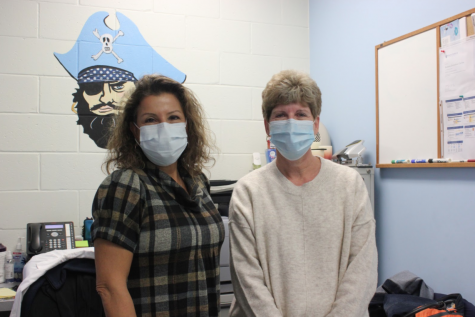
Karin Reyes & Susana Gonzalez-Cortes – Nurses
Q: How long have you worked at Berkeley?
A: (Reyes) Gosh, like 12 years? Nurse Gonzalez has been here almost 20, I think.
Q: Could you describe a typical day as a nurse at Berkeley?
A: (Reyes) We usually get children that lose their teeth or get bumps and scrapes. Then, we have an occasional broken arm or a cut that needs stitches, but every day is different. You can never predict what’s gonna happen.
Q: How has your job changed since COVID-19?
A: (Gonzales-Cortes) Well, it has changed our job completely. It has expanded many different kinds of duties that we have to do, and it is extremely time consuming at times. We became certified as “contact-tracers” by John Hopkins University, and we [contact trace] every time we’re notified of an exposure case. So, that requires a lot of investigation, which actually is kind of interesting. We have to do a lot of research to keep up with a lot of data, watch how [COVID-19] advances and the trends that are happening in the community and actually deal with the cases or exposures.
Q: Do you feel that there’s been anything positive that’s come out of that situation?
A: (Gonzales-Cortes) Actually, there are a lot of the things that we, as a school, have changed, like techniques and things like that. I think a lot of people are finding that there are some [practices] working better than they actually did before. They might want to keep them implemented even after everything goes back to normal. In other words, you wouldn’t have tried them without the COVID-19 situation happening. So, that’s kind of the one positive thing that came out of the situation.
Q: What are some of your hobbies and interests outside of work?
A: (Gonzales-Cortes) I like a lot of different things! I always have some sort of project. Whether it’s reading, art, calligraphy, learning a new language — I have a lot of different interests.
A: (Reyes) Going to the beach, you know, going to the gym or biking — just a lot of different things.
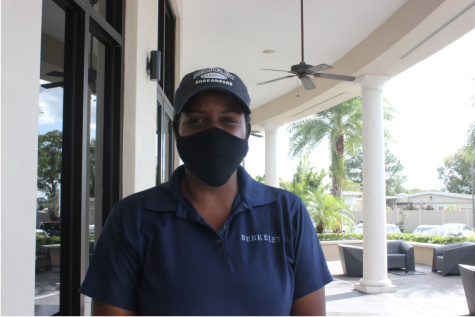
Sara Villanueva – Custodian
Q: How long have you worked at Berkeley?
A: Five years.
Q: Could you describe a typical day in your job at Berkeley?
A: I love it. I love it. Love the kids, I just love it. It’s like, it’s amazing.
Q: What would you say is your favorite part of the job?
A: My favorite part of the job… coming to work and seeing everybody’s face and helping everybody out.
Q: How would you say that your job has changed because of COVID?
A: It’s changed. We haven’t seen a lot of students like before. It’s sad, but at the same time we all still are family.
Q: What are your hobbies and interests outside of work?
A: Music. Anything that has to do with music. Dancing, singing, anything.
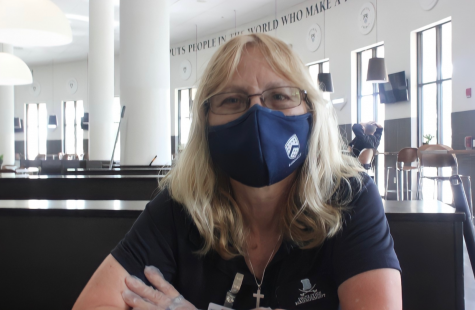
Penny Everhart – Custodian
Q: How long have you been at Berkeley?
A: Four years.
Q: How would you describe a typical day in your job here?
A: Busy. Always busy. We come in at 8 o’clock and we start. And kids are already here. All the way through when we leave at 4:20. Well, actually, we close everything down at 1:15, but we have pre-games that come in after 3:30, so we have a little bit of a window. When everybody leaves is the only time to really clean. Because they’re here all the other times. But, it’s just busy.
Q: What would you say is your favorite part about your job?
A: The kids, the teachers, everybody. It’s like a family; it’s like a community. Everybody is really good.
Q: How would you say that your job has changed because of COVID?
A: The only thing that’s really changed is that we are open in the morning, all the time now. We don’t close at 9:15 like we used to to clean. We clean around the kids. So it’s just more cleaning, because a group goes, we clean, a group comes, we clean, a group comes, we clean, it’s like that all day. That’s the only difference.
Q: Would you say that there’s anything positive that has come out of this situation with the pandemic?
A: If anything, it’s just they’re washing their hands more. I wish they would keep their distance a little bit more, but they don’t do that. It’s hard for kids; it’s hard for adults, so I can imagine kids. But, that’s about the only thing. They’re just cleaner. They wash their hands more and stuff like that. They’re more aware, using sanitizer and stuff like that.
Q: What do you like to do outside of work? What are your hobbies and interests?
A: Well, I wrote a book about domestic violence, and I do a lot of advocacy work for that. I do a lot of work with the homeless. I try to help out as much as I can, so things like that. I try to give back a little bit.
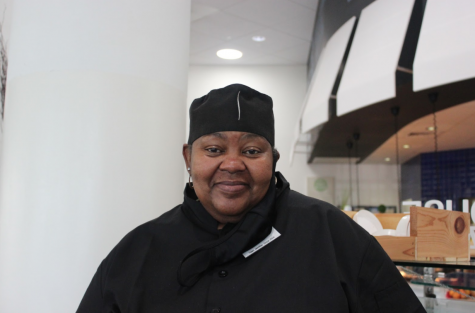
Pat Lockhart – SAGE Team Member
Q: How long have you been at Berkeley?
A: I [will have] been here sixteen years [on] November 17th.
Q: Can you describe a typical day in your job at Berkeley?
A: On a typical day, I get here – I used to get here at six in the morning – now I get here at 9:30. I prep […] my area, I get the silverware ready for the line and I prep the soup and the pasta and make sure my station is clean and ready for the kids when they come in. Sanitized and healthy. That’s what I do.
Q: What would you say is your favorite part about your job?
A: The kids. I love anything I do with the kids.
Q: How would you say that your job has changed because of COVID?
A: Actually, I had COVID, and I was in the hospital for six days, damaged my kidney. And I’m here, but I’m not full-time because of my health. But, being here, seeing the kids, plays a big part in my life that makes me want to be here longer because I see the kids, they come up, they speak to me and that touches my heart. I love the kids. These are my babies.
Q: What would you say is something good that has come out of this situation with the pandemic?
A: Everybody’s more focused now. And they’re nicer.
Q: What are your hobbies and interests outside of work?
A: I do catering on the side. So, that’s my hobby, and this is what I love to do. I went to school for cooking, and that’s what I do. I love interacting with people and I love catering.
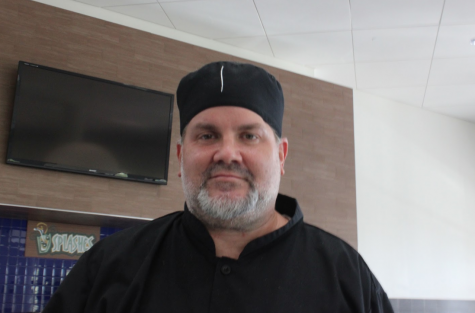
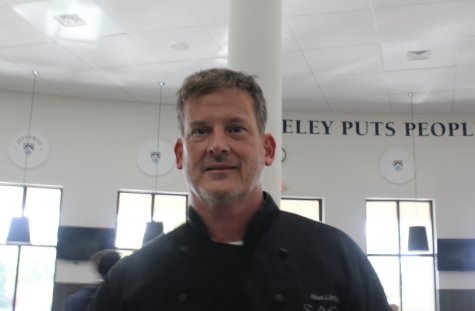
Jim English – SAGE Team Member & Ron Linton – SAGE General Manager
Q: How long have you been at Berkeley?
A: (English) Since December of 2018.
A: (Linton) I’ve been at Berkeley for three years.
Q: Could you describe a typical day in your job here?
A: (Linton) Well, a typical day is when I first walk in at 6 am, I check to make sure that everyone takes their temperature for COVID and that’s our first policy. We have to make sure everyone that walks through the door takes their temperature to make sure that they’re safe to work. After that, I walk around and make sure everybody has what they need for the day. And then I help everyone at their station to make sure that they’re up and ready and prepping for lunch. After that, what I do is I go back in the office and make sure that there’s no emails that came through to change any of our catering or anything like that, because we do a lot of catering. So I have to check emails to make sure there’s no special requests. So, if there’s no special requests, there’s no catering, what I do is I come back out and I help the team prepare lunch and make sure everything is ready for lunch. One of the things I have to do every day is I have to walk to the other two schools. I have to go down to SCECE (Seivold Center for Early Childhood Education) and then I also walk over to [the Lower Division Activity Center] to make sure that they’re okay as well, because we have two employees at each one of those units. After that, around ten o’clock, we just all get together and make sure we set up lunch, get everything ready for you guys, so when you come in everything’s nice and clean and ready. Around 1:30, we sit down as a team and we eat lunch. After that, we clean up, we basically go through, disinfect, sanitize all the equipment and everything. And then, we start to depart. We leave for the day. And that’s about it.
A: (English) Well, I come in, and as Ron stated earlier, we do our COVID temperature checks and all that good stuff; clean your hands, clean your space again, because you never know who’s been at your space the night before. I check the menus, double check, make sure we’re still doing the same menu and then I prep and make and cut and wrap over 300 sandwiches every day. And then at 9:30 I head out here to the main cafe area and I cut and store all the pizzas for the day. And a typical day we’ll serve anywhere between 75 to 100 pizzas. So, after that, after the three lunches, we clean up and then I’ll check and see what I need to cut and prepare for the next day, whether it’s cheeses or meats and if it needs [to be] sliced, I’ll slice that and then I’ll clean up and then go home.
Q: How would you say that your job has changed because of COVID?
A: (English) I would say we’re doing more the grab-and-go proportioning over years past. Before, you guys used to serve yourselves in the cafe. Actually, all the food service areas now are pretty much how lower [division] is done on the normal with prepping everything, cupping everything, wrapping everything, making sure it’s safe because of COVID. There’s more detailed cleaning now. It’s almost like a double check; you clean it and then you clean it again and then you sanitize it again, just to make sure. A lot more washing the hands, a lot more glove changing and then the mask, absolutely. And then keeping, you know, space. We used to not really worry about working right next to someone; now you’re limited in time when you can [work next to someone]; it’s only when necessary.
Q: What is one good thing you would say has come out of this situation with the pandemic?
A: (Linton)Well one thing that’s on our part is that now that we have three meals instead of two so we can do more batch cooking. So, what that helped us do was it gave us a time in between each group to do a full sanitation. We walk through, make sure everything is sanitized and disinfected, so that has helped us as far as setting up food and making sure everything out here is taken care of. The biggest change because of COVID is we had to have more people come in and work other people’s jobs, so it’s helped us cross train the team. So everyone is more aware of what everyone else does now and that’s very beneficial to me as a manager. So everyone kind of can fill in for other people when they call [in] sick or whatever and that’s very helpful.
Q: What would you say is your favorite part of your job?
A: (English) Connecting and conversing with all the kids and the staff. Since the first day I’ve been here, the staff has been more than welcoming, did not treat me like an outsider, which is very rare, when you come, especially to a private school or a prestigious workplace like Berkeley. From Mr. Seivold, Mr. Jordan, all the way down, not to exclude Mr. Houston, they’ve pretty much befriended me way above and beyond anything I can expect. The first year I was here, I made contacts with Coach Ciao and Coach Richie Warren. and Richie invited me over too, I’ve taken probably twenty thousand pictures of the baseball team’s games in the last two and a half years. And he’s always introduced me to the team mom, and we’ve had a good relationship going back and forth. Like I said, I’ve done lots of photos for these kids, and the parents are quick to soak them up. And then with Coach Ciao, I took pictures of one football game and then he grabbed me and asked me if I wanted to run the video and now for the last two and a half years I’ve run the endzone video for the football games.
A: (Linton) It’s about interacting with the students and staff. I mean, we love to keep you guys happy, we like to see the smiles on your faces when you walk in and you are like “what’s for lunch” and we can hear you walking in, “Oh yay!” you know. That’s the best part of it. We get to actually sit down a lot and eat sometimes with the students and get their feel for what their likes are and their dislikes of the menus. So it’s just that, working with them and trying to make them happy. We make sure that they are, you know, thought of; that they know that their opinions matter. We like to get their thoughts on what they want more of and less of on the menu so that we can write the menus based on what their likes are and their dislikes.
A: (English) Absolutely. I mean, I think that’s one thing that’s increased with COVID too. It seems like the kids are more appreciative. Not that they ever […] [were] disrespectful or anything here, but they’re showing more gratification.
Q: What are your hobbies and interests outside of work?
A: (Linton) Well, working out. I try to stay in shape by running and kayaking. I try to do a lot of kayaking, fishing, things like that. I like to be outdoors.


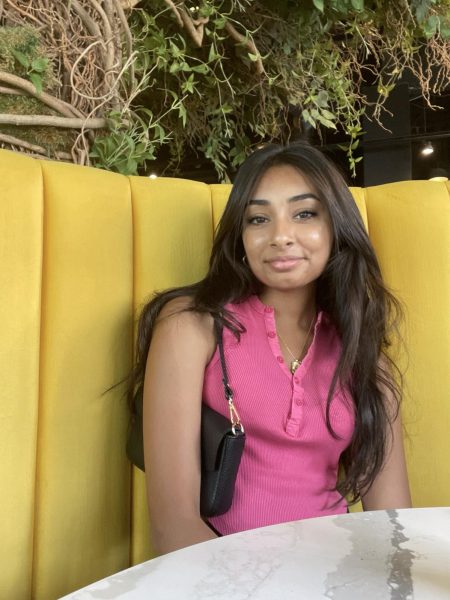
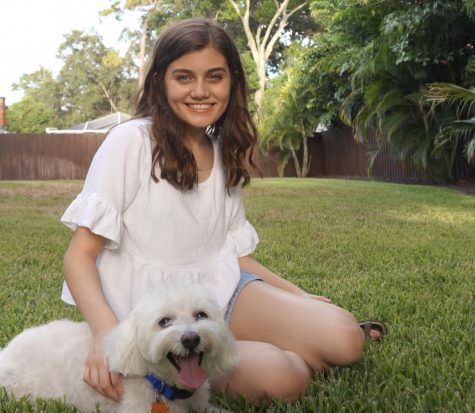
Mr. Johnson • Dec 5, 2020 at 8:55 am
This is wonderful. Thank you for sharing.